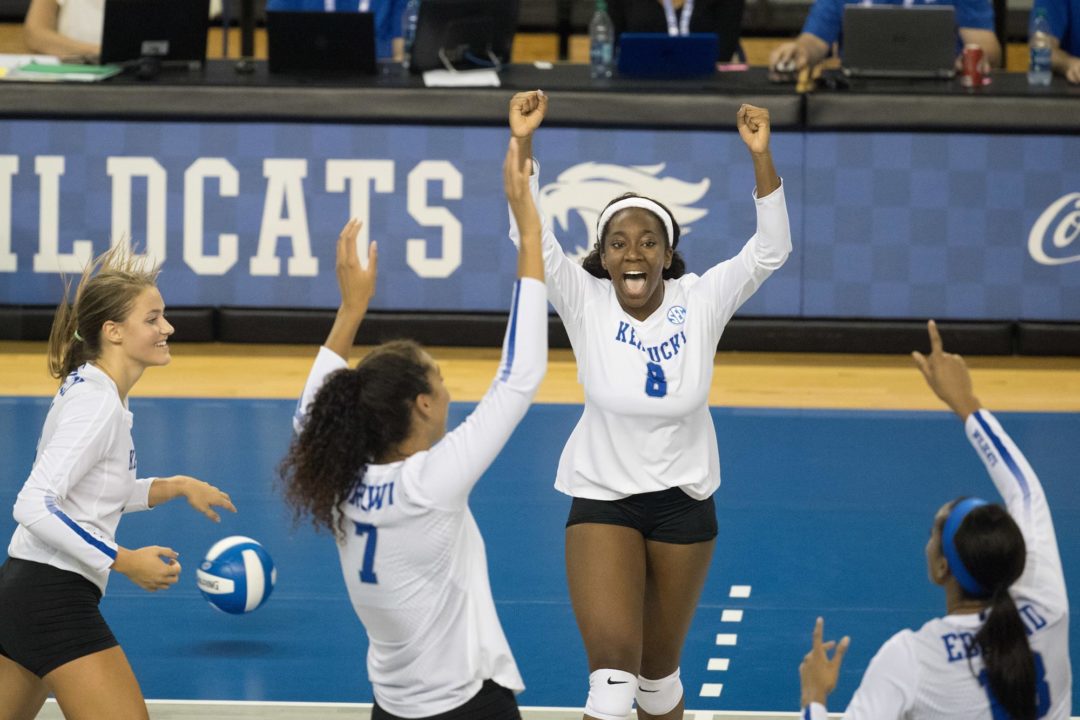Typically, we at VolleyMob turn our scouting reports into a two-part series; one before the match, and one after. However, the final undefeated team losing in NCAA Division I got us to think: how did the Wildcats do it? Below is a more specific breakdown of the UK successes and what went wrong for Florida. If you wish to read just the match report, click here.
THE SHORT VERSION
If you’re looking for a short answer to Kentucky’s mastery on Sunday, look no further that the Wildcats’ balance and efficiency. Coming into the match against UF, Kentucky led the conference in hitting percentage, kills per set and assists per set. A quick glance at the box score reveals the balance: four players in double-digits in kills, averaging 16 kills per set (2.5 kills per set above their team average prior to this match) and finishing the match hitting over .300.
THE LONG VERSION
Yes, I know that you know how to read a box score. So do most that even mildly follow volleyball. Looking further, there are a few things to look at:
- Kentucky has done this before
This win for the Wildcats was the third consecutive in which they won in Gainesville. Although last year’s contest was a little more defensive-minded, Kentucky came out with “guns a blazing on every single swing”, as quoted by UF sophomore middle blocker, Rachael Kramer. Kramer should know; she led the Gators in kills with 15 and hit .423 on the match.
- Senior leadership
Coach Skinner alluded to the leadership required to come back after losing set three the way the Wildcats did. UK was two points away from finishing off UF in a sweep, only to see the Gators finish on a 4-0 run. Three of the points in that run were hitting errors by UK. Normally, teams in a mental team sport such as volleyball might roll over and use the mild failure in the end of set three as an excuse to lose set four. The seniors wouldn’t let that happen.
“I love the composure and toughness of the team after set three,” coach Skinner said. “I give a lot of credit to our seniors for leading the charge with their confidence. Darian Mack was big time Mack today. This team continues to impress us as a staff with how much they want something else, something beyond what they’ve done before.”
Well said, coach.
- Offensive balance
Balance to me means multiple options at all times. When you have more than one attacker among your offensive options that can terminate a play, it becomes increasingly difficult to key on any one attacker. Kentucky has that aspect in droves. At any one time, the Wildcats had at least two double-digit attackers in the front row, and one in the back row. Even their fifth-best attacker against UF, Emily Franklin, had 8 kills hitting an error-free .571 on the day. Go ahead, pick someone to key on; the other four attackers will get theirs too.
- Florida’s lack of balance
Just as Kentucky featured four double-digit attackers and another hitting over .500 (8-0-14), Florida lacked the balance required. Only three double-digit attackers, and only one of those a pin attacker. In this author’s humble opinion, without a double-digit kill pin attacker, the middle is forced to do the heavy lifting, and middles can normally only be set when in system. Additionally, in a 6-2 system, you feature six attackers. When only three of those attackers have more than 4 kills, your offense becomes predictable.
In Florida’s defense, they did put up quite a fight in this match. What wasn’t working for UK in set three was not necessarily their fault—-Florida found the key in set two. Forcing the Wildcats to be one-dimensional can only happen by keeping them out of system and take less swings. The Wildcats had identical kills in sets 3 and 4, yet the results were so much different. The more swings without kills a team takes, the less efficient they become. As it turned out, it was set two (.194) where UK was the least efficient, but Florida had efficiency issues of its own (9 kills, 9 errors) and couldn’t take advantage. Even if the Gators had a marginal hitting efficiency in set two, this match could have turned out a lot differently.

Leave a Reply